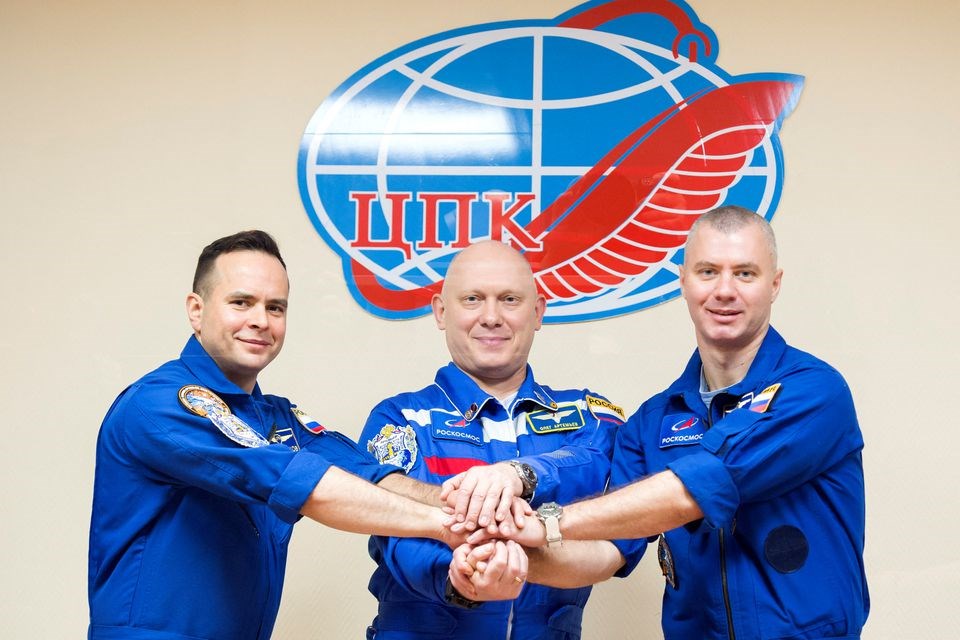3 Russian cosmonauts land on ISS despite US-Russian tensions
Sanctions against Russia could pose danger to space missions - could NASA set their differences aside?
-

Russian cosmonauts Oleg Artemyev, Denis Matveev and Sergey Korsakov pose for a picture during a news conference ahead of the expedition to the International Space Station (ISS) at the Baikonur Cosmodrome, Kazakhstan March 17, 2022. (Roscosmos)
On Friday, three Russian cosmonauts safely arrived at the International Space Station (ISS), docking their Soyuz capsule with the outpost for a mission that continues an over-20-year Russian-US collaboration on a mission in orbit. This comes despite rising tensions between Moscow and Washington.
The meeting came after about three hours from the launching of the Soyuz aircraft, which carried the team, from Russia's Baikonur Cosmodrome in Kazakhstan.
Oleg Artemyev, a Soyuz commander, led the Soyuz team, and was accompanied by Denis Matveev and Sergey Korsakov, who are spaceflight beginners on a science mission.
Aboard the mission are three NASA astronauts: Tom Marshburn, Raja Chari and Kayla Barron - and German team member, Matthias Maurer of the European Space Agency, who have abord since November, arriving on a SpaceX Crew Dragon craft.
The ISS, since opening in 1998, has been led by a US-Russian collaboration that includes Canada, Japan and 11 other European countries.
Could it be the case that Russia is more willing to collaborate in keeping the International Space Station in full function than Washington?
Just two days ago, Marck Vande Hei, a US astronaut that had been in space for 355 days, returned on a Russian rocket amid the anti-Russia sanctions and rising tensions.
Joel Montalbano, NASA's International Space Station (ISS) program manager, said, "I can tell you for sure Mark is coming home... We are in communication with our Russian colleagues. There's no fuzz on that."
International space law dictates that all astronauts, regardless of nationality, must "provide all possible help," to other astronauts in need, which includes "emergency landing in a foreign country or at sea."
Dmitry Rogozin, the head of Russia's space agency Roscosmos, has previously warned about sanctions causing technical problems with the ISS, but Montalbano claimed it had continued to operate normally, expressing that "all these activities have continued for 20 years and nothing has changed in the last three weeks. Our control centers operate successfully, flawlessly, seamlessly."
The US is in charge of electricity and life support aboard the ISS, while Russia is in charge of things like propulsion.
Read more: Roscosmos: Sanctions could cause space station to crash
Rogozin even provided a map, created by US astronomers, that depicted potential areas of an ISS fall in the event of an uncontrolled orbital decay.
Head of Roskosmos Rogozin publishes the map of countries ISS flies over on his Telegram and says he is sending letters to NASA (and CSA, ESA and ASE) demanding the rollback of sanctions and asks about the territories of which countries the 500-ton space station could land on... pic.twitter.com/HF1uxfaHXE
— Dmitri Alperovitch (@DAlperovitch) March 12, 2022
"It just shows that this is Russia that poses the least danger of ISS destruction. But populations of other countries, including those led by "dogs of war", should think about the price of the sanctions they initiated against Roscosmos, the price of international space cooperation maniacally destroyed by the West," he added.
Last month, Rogozin, while blasting Western sanctions on Twitter, raised the threat of the space station collapsing.
Part of Washington's economic sanctions on Russia are to target high-tech export restrictions against Moscow, Biden ordering high-tech export restrictions to "degrade" Russia's aerospace industry.
Read more: Japan, Australia impose more sanctions on Russia targeting nationals, entities
The website of the Russian space agency Roscosmos has recently been subjected to a massive DoS attack carried out from various IP addresses one more time, after the Anonymous hacker group's declaration of a cyberwar against Russia, the agency's press service.
NASA officials contend that US and Russian ISS crew members continue to work together professionally and the tensions back down on Earth do not affect that.

 4 Min Read
4 Min Read









